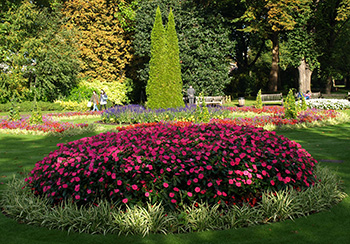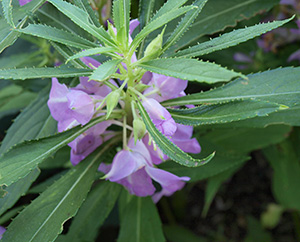New Guinea Impatiens

Note: The UF/IFAS Assessment of Non-native Plants in Florida’s Natural Areas has predicted that traditional impatiens (Impatiens walleriana) may become an invasive risk, and as such we no longer recommend this plant.
Until several years ago, traditional impatiens were the norm with their easy-to-grow, self-seeding habit. Unfortunately, downy mildew disease took them out of production nationwide. Luckily, mildew-resistant New Guinea impatiens and SunPatiens have filled the void as colorful options.
New Guinea Impatiens
New Guinea impatiens (Impatiens hawkeri) were introduced to the U.S. in the 1970s. Larger than traditional impatiens and with bigger flowers, these colorful annuals do best in partial shade and in rich, well-drained soil.
New Guinea impatiens offer dazzling, high impact color in bright red, orange, pink and white hues that attract butterflies and look great when planted in flowerbeds, borders, hanging baskets or containers. In North and Central Florida, flowering is best in spring and fall, but in South Florida they will flower throughout the winter. While flowering is minimal in Florida’s summer heat, the foliage still catches the eye, with serrated leaves that can be a deep green to bronze and even variegated.
Plants are hardy in USDA Zones 10-12, but will be killed by frost. Because New Guinea impatiens require regular watering, be sure you plant them around plants with similar watering needs.

SunPatiens
SunPatiens are cultivated hybrids created specifically to thrive in hot, humid, sunny weather. As a result, they’re perfect for Florida and flower year-round. Like New Guinea impatiens, SunPatiens are unaffected by downy mildew and require regular watering. Unlike New Guinea impatiens, these hybrids do best in full sun.
And one more

Commonly called rose balsam or garden balsam, Impatiens balsamina is an heirloom plant that was very popular in the 1900s before I. walleriana took its place in gardens. It may be difficult to find, but this tender annual is reported to attract both bees and hummingbirds.
Also on Gardening Solutions
More from UF/IFAS
- Enjoy the new and improved “Touch-Me-Nots”–UF/IFAS Blogs Charlotte County
- Impatiens balsamina–UF/IFAS Assessment of Non-native Plants in Florida’s Natural Areas
- New Guinea Impatiens–Ask IFAS (please note that this publication uses an outdated botanical name)
